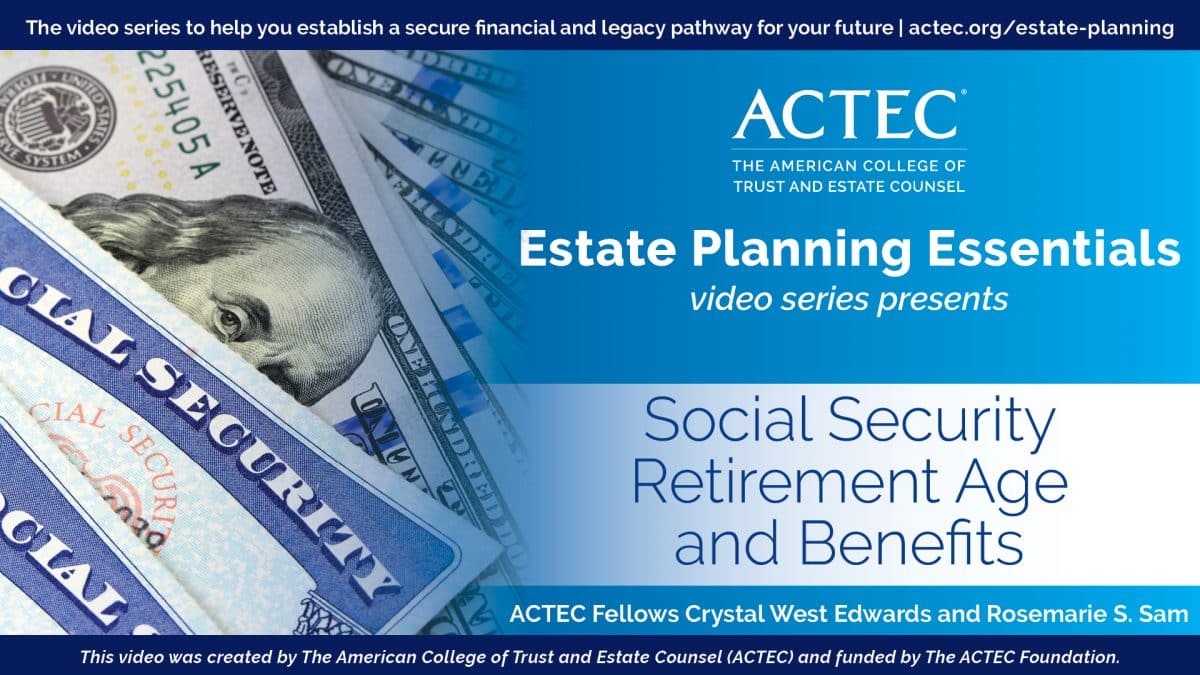The SECURE Act (Setting Every Community Up for Retirement Enhancement), enacted in December 2019, changes everything concerning estate planning with retirement benefits. Learn the new IRA age distribution requirement, the impact to beneficiaries, changes to the “stretch” and individuals exempt from the limitation.
ACTEC Fellows Steven E. Trytten and Nancy H. Welber help families understand the new rules and what it means to their retirement plans.
Transcript
Hello, my name is Nancy Welber. I am an attorney in Farmington Hills, Michigan and I am a Fellow of the American College of Trust and Estate Counsel, also known as ACTEC. Today, Steve Trytten and I are going to talk about the SECURE Act (Setting Every Community Up for Retirement Enhancement). Steve is also an ACTEC Fellow from Pasadena, California.
Steve, can you tell us a little bit about the SECURE Act?
Understanding the SECURE Act
Steve Trytten: It’s a pretty important act. It’s brand new. It passed right at the end of 2019; it has a lot in it that affects retirement plans. We’re going to focus today on the things we think would be of most interest to any individual who owns a retirement plan and is wondering how to plan for that.
So, Nancy, is there anything in particular that someone approaching 70 should be aware of with the new act?
Nancy Welber: Yes, Steve. Age 72 is now the new age 70 ½, which is really great for people who need to take distributions from their IRA. So, they can wait until April 1st following the year that they obtain age 72 to start the required minimum distributions, and if they’re still working, most people can also wait until the April 1st after the year that they retire. But Steve, tell us also what’s new from an estate planning standpoint.
Steve Trytten: Well, Nancy, I’m afraid we have a good news/bad news situation here. There was a very valuable benefit under prior law that’s been taken away called the “stretch.” The way the stretch would work is if I designate my son as beneficiary and I die, he can take distributions very gradually over his lifetime and that tax-deferred compounding will make the account at least twice as valuable to him after tax. Well, while they’ve taken that away from most people, it’s now a 10-year rule. It doesn’t mean 1/10 each year, it just means it has to be out at the end of 10 years, but it is still a big step. It’s made every account less valuable to the beneficiaries.
But, can you tell us about some of the exceptions to that 10-year rule?
Nancy Welber: Yes, thanks Steve. We actually have five exceptions from the 10-year rule, and these all apply to individuals. The number one person who is exempt is the surviving spouse. So, you don’t have to worry if you’re married. Your spouse’s rollover or any other options that your spouse may have are not impacted by the SECURE Act. There are four other categories; one is the minor children of the account owner, and keep in mind that these minor children must be the account owner’s children. So, grandchildren need not apply. It doesn’t apply to them. In addition, they have limited stretch until they reach the age of majority, which may include up to age 26 if they are enrolled in a specified course of education. We’ll need more guidance from the IRS until we know exactly what that means, but the maximum stretch would be until age 36 for a minor child of the account owner.
In addition, if someone names their sibling, for example, or another beneficiary that’s not more than 10 years younger than them, they can also use the stretch. And, it’s important to understand that the person could be older; they just can’t be more than 10 years younger. Finally, there’s a special category for disabled or chronically ill beneficiaries, and we’re going to talk about that a little later.
But, Steve, it’s also important to know that a lot of people take their retirement benefits through trusts. So, when they inherit through a trust, what’s new with that?
Steve Trytten: Well, the 10-year rule is a big change and it ripples through the trusts that are often used. So, anyone who has an estate plan probably should have it reviewed to see if, in fact, that estate plan involved designating IRAs or plans to trusts because those trusts may not work the way they were intended. In some cases, they can pay the whole plan out to the beneficiary in 10 years, which is probably not what the client had in mind.
Nancy, could you tell us a little more about some of the special planning we may need to think about for beneficiaries who are disabled or chronically ill?
Nancy Welber: Sure, Steve. As we mentioned before, as I’ve mentioned, there is a special category – two special categories – for people who are disabled or chronically ill. And those definitions are found in the Internal Revenue Code, so, you’ll need to pay special attention to that. In addition, there was a new provision added at the very last minute to this legislation that allows special treatment for the disabled and chronically ill beneficiaries of trusts that allows them to stretch over their life expectancy. It’s a very important and very technical provision. So, if you have a disabled or chronically ill beneficiary or think that you may have a disabled or chronically ill beneficiary, it’s very important to see an estate planning lawyer who specializes in that area and can give you good guidance in how to name an IRA or other retirement account to a trust for that beneficiary after the SECURE Act.
Steve Trytten: Those are important issues, Nancy. If anyone needs benefit in the protection it would be those disabled and chronically ill. Well, that’s as much as we have time to tell you about right now. Nancy, it was a pleasure doing this with you.
Nancy Welber: Likewise, Steve. And, the important takeaway is, this Act changes everything with regard to estate planning with retirement benefits. So, Steve and I both urge you to see an estate planning lawyer sometime this year. Thank you.
Featured Video
Social Security Retirement Age and Benefits
Understand the advantages and disadvantages of taking Social Security retirement benefits at different retirement ages and the impact on dependents.
ACTEC Estate Planning Essentials

ACTEC Fellows provide answers to frequently asked trust and estate planning questions in this video series.



